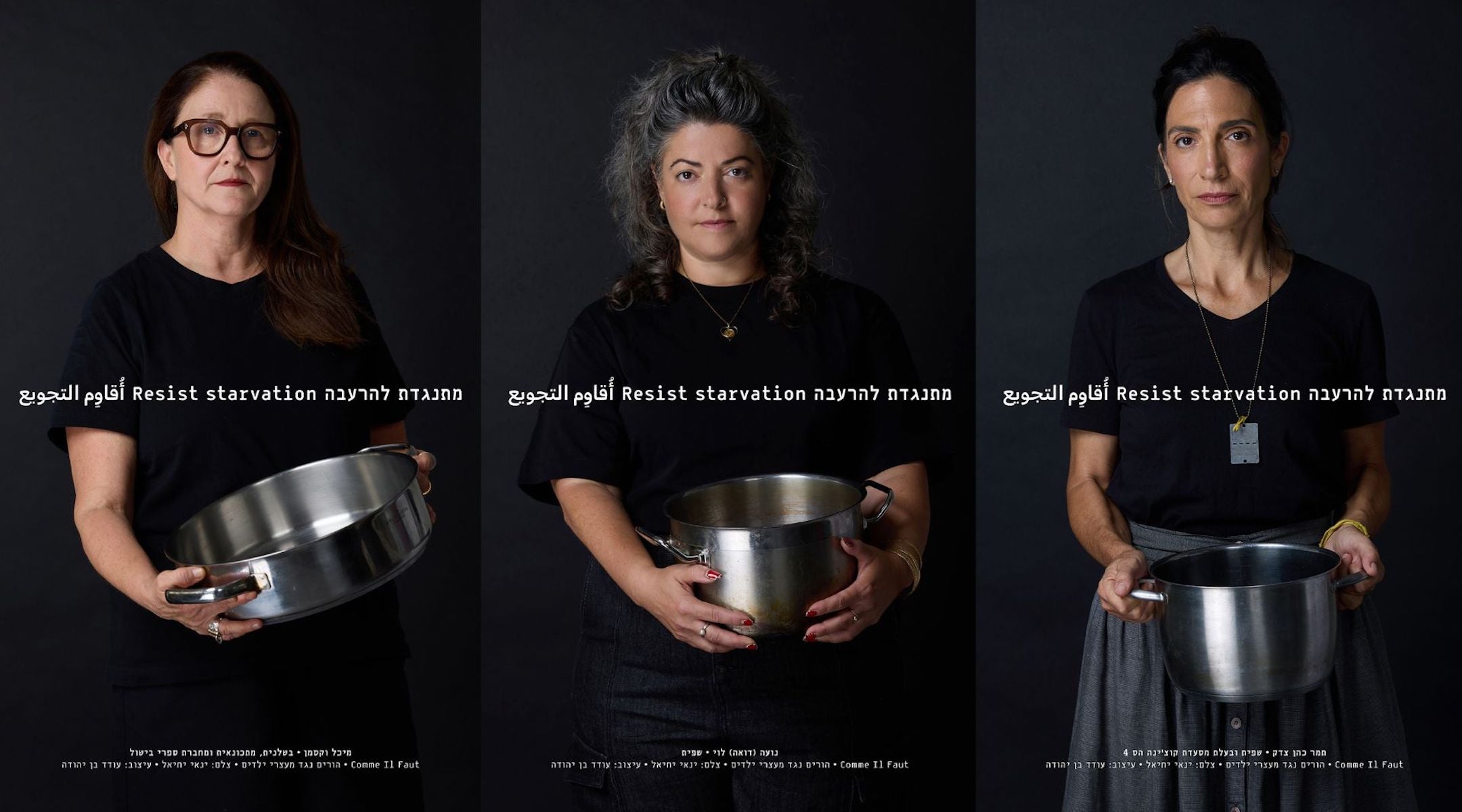In the early days of the war in Gaza, the Israeli women’s fashion brand Comme Il Faut launched a campaign with prominent models and female business leaders drawing attention to the Israeli hostages abducted by Hamas.
This week, the brand turned heads again: with a social media campaign protesting alleged starvation among civilians in Gaza.
Israeli chefs and restaurateurs hold empty pots along with the caption “Resist starvation” in Hebrew, English and Arabic in the campaign, which was posted to the brand’s Instagram and Facebook accounts. The campaign has stirred controversy and condemnation among an Israeli public that is both ready to end the war in Gaza and torn over reports about grim conditions for the Palestinians who live there.
“We thought, because of what’s going on in Gaza and the hunger in Gaza, to do this photo shoot with people from the food industry and chefs,” Romi Kaminer Goldfainer, the director of Comme Il Faut, said in an interview. “We thought how difficult it is to talk about fashion during this time — it’s even harder to talk about food and wine [and] dining when there’s this terrible hunger, like in one hour away from Tel Aviv.”
Kaminer Goldfainer, whose mother Sybil Goldfainer founded the brand in 1987, said she was inspired after seeing an Israeli chef’s recent social media post about struggling to promote their business amid reports of starvation in Gaza.
“We make clothes for women, and we believe that fashion is also a political thing, like food, like anything in culture,” she said.
The campaign lands as conditions facing Gazans after nearly two years of war are gaining attention among Israelis in new ways. Israel has long rejected claims of starvation in the enclave, but last month, a global hunger monitoring group released a report stating that parts of Gaza meet its standards for declaring a famine. Amid an international outcry and growing opposition among the Israeli public to the war, Israeli news organizations have begun reporting more often on the plight of Gazans and some anti-war protesters have started incorporating the photographs of Gazans into their demonstrations.
But some Israelis have rejected the expressions of concern, charging that they represent giving aid to an enemy and place the onus of responsibility unfairly on Israel — criticism also leveled recently at efforts by Diaspora Jews to blunt the privations of war on Gazans.
Such sentiments exploded in the comments of Comme Il Faut’s Instagram posts.
“Tell it to Hamas. The food is at their place,” wrote one user. Another posted, “The only ones who are starving are our kidnapped. Shame of a campaign.”
Kaminer Goldfainer said the expectation of such a response deterred some potential participants in the campaign.
“People are very afraid for their businesses and for speaking up,” she said. She said Comme Il Faut had reached out to almost 100 Israeli chefs and restauranteurs to see if they would participate in the campaign, but many said no or did not respond to their inquiry. Others cancelled after initially saying yes for fear of the backlash.
In the end, the campaign featured a dozen Israeli chefs and restauranteurs, including Michal Levit, a food culture researcher; Tamar Cohen Tzedek, the chef and owner of the restaurant Cucina Hess 4; Avivit Priel Avichai, the chef and owner of Ouzeria restaurant; and Aviram Katz, the restauranteur behind HaBasta, Mifgash Rambam and Morris Bar.
In the caption of some of the posts, the chefs wrote in Hebrew, English and Arabic that they “can no longer stay silent in the face of the systematic starvation of the people of Gaza and the hostages among them.”
“Our stomachs turn. From its depths, from the abysses of the soul, we cry out against the starvation of millions of innocent people and children, who are perishing and dying en masse,” the captions continued.
Comme Il Faut also collaborated with Parents Against Child Detention, an Israeli organization that raises awareness about the mass detention of Palestinian children, on the campaign.
“Our protest against hunger is a protest on behalf of the children and girls, who have no voice in the public sphere. For us this is not a political question but a basic moral responsibility — no boy and girl should starve,” PACD wrote in an Instagram post of the campaign.
“The voices that arise from the food community, from people and women whose lives are devoted to food and filling, echo our call: you must not comply with the reality of empty pots,” the post continued. “We will continue to fight — until the pots are full.”
JTA has documented Jewish history in real-time for over a century. Keep our journalism strong by joining us in supporting independent, award-winning reporting.






